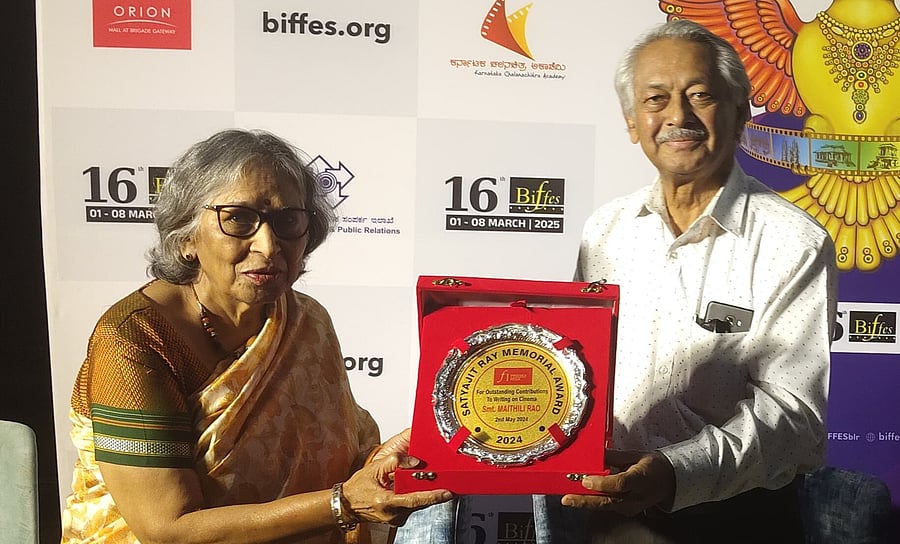
Girish Kasaravalli presents the Satyajit Ray Memorial Award to Maithili Rao.
Bengaluru: The 16th Bengaluru International Film Festival (BIFFes) continued to engage audiences with a series of captivating sessions and discussions on its penultimate day.
Film auteur Girish Kasaravalli presented the Satyajit Ray Memorial Award to veteran film critic Maithili Rao. The award is presented to honour lifetime achievement in film criticism. Artistic director of BIFFes N Vidyashankar, the president of FIPRESCI India V K Joseph and the General Secretary of FIPRESCI-India and Vice President, Federation of Film Societies of India Premendra Mazumder were also present.
A seminar on ‘Film Criticism - Challenges, Opportunities, and Emerging Platforms and Points of Review’ was organised along with FIPRESCI India and R V University. The session was moderated by film scholar N Manu Chakravarthy.
Maithili Rao expressed her thoughts on the evolving nature of film criticism in her keynote address. She raises fundamental questions regarding the purpose of film criticism in today’s changing socio-political and economic context. Her criticism explains the need to “keep (ing) off from the jargon of literary criticism and film criticism in writing” especially while portraying women in cinema, so that the main focus can be the subtext of films.
Rao also warned the audience, “Mainstream cinema has become full of toxicity” and how Bollywood is getting influenced by south Indian films like ‘Pushpa’, ‘RRR’, and ‘KGF’, forming hybrid films like ‘Animal’.
In his address, Kasaravalli acknowledged Rao for influencing his “understanding of cinema” through her writings. “My perspective on filmmaking, film appreciation has enhanced considerably through her writings,” he said. Kasaravalli described Maithili Rao as the most deserving critic in India today. He applauded her ability to approach films beyond theoretical constructs, paying close attention to emotional experiences and approaching them from a feminist framework.
Kasaravalli reflected on Satyajit Ray’s legacy and contribution to Indian cinema, calling him a “practicing filmmaker”. He highlighted his unique approach to film appreciation which is quite different from an academician’s approach. “Ray would understand the experience of cinema, how that experience is put across in this medium, and then analyse the context.” he shared, also adding, “As a practicing filmmaker, I am greatly benefited by that approach.”
Taking Ray’s fantasy-adventure film ‘Goopy Gyne Bagha Byne’ as an example, Kasaravalli emphasised on the importance of music in cinema. “The iconic ghost dance scene is influenced by south Indian Karnatik raga and Bharatnatyam,” he added.
The panelists discussed the intellectual challenges in film criticism, mainstream media and digital shifts, the future of film criticism and cinema’s influence on society.
Chakravarthy warned against aesthetic reductionism, highlighting capital dominance, ideological manipulation and political polarization, while stressing cinema’s intellectual significance.
Piyush Roy, a professor at R V University brought attention to film criticism’s shift from traditional media to digital platforms, recommending rigorous academic training amid evolving viewing advancements.
Film critic Pranjal Bora reviewed neuroscience’s role in film consumption, warning about digital technology’s psychological impact and increasing susceptibility to propaganda by the audience.
Vedant P, also a film critic. urged for deeper engagement with historical contexts, referring to Gramsci’s hegemony, while calling into question film criticism’s dilution in the digital age.